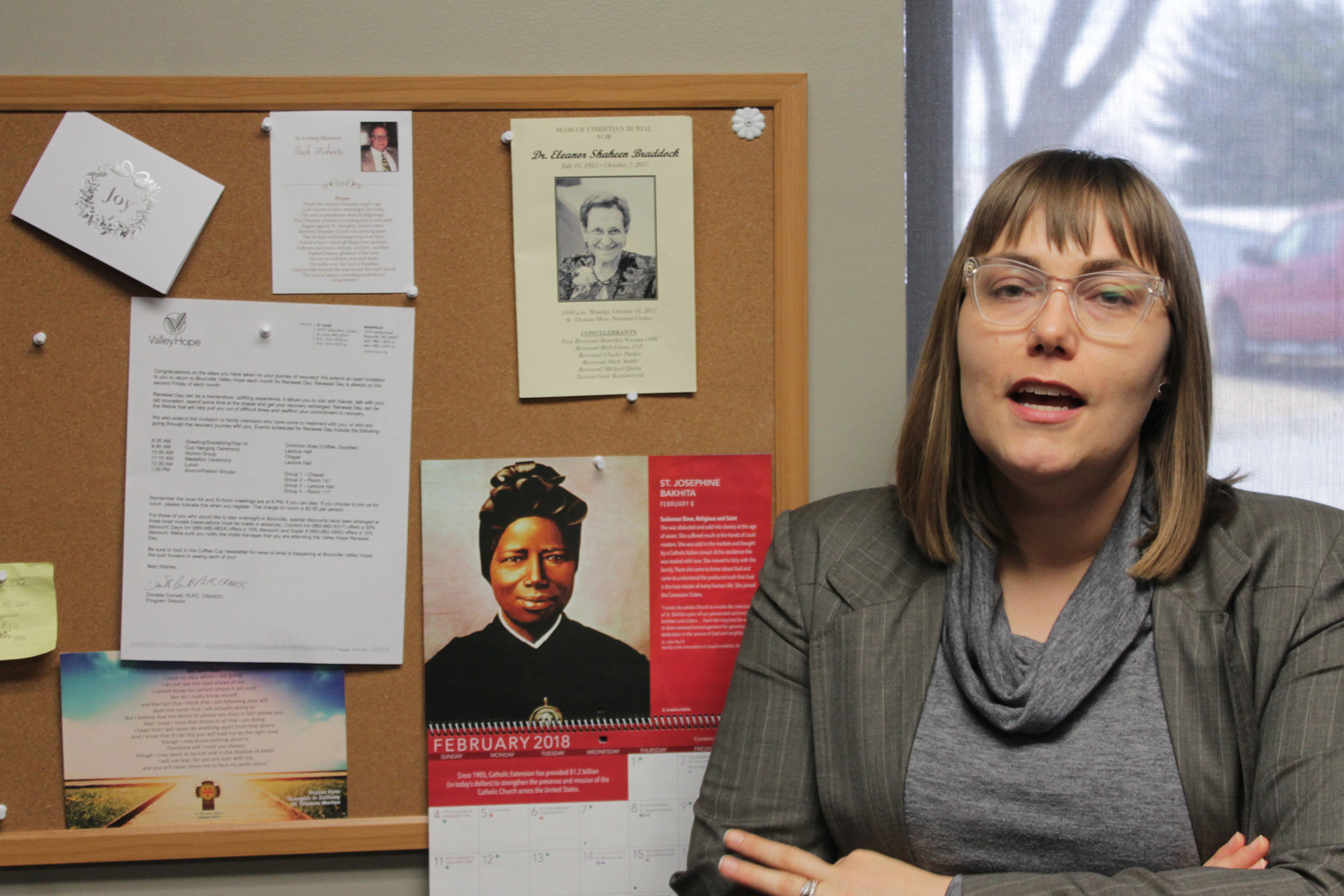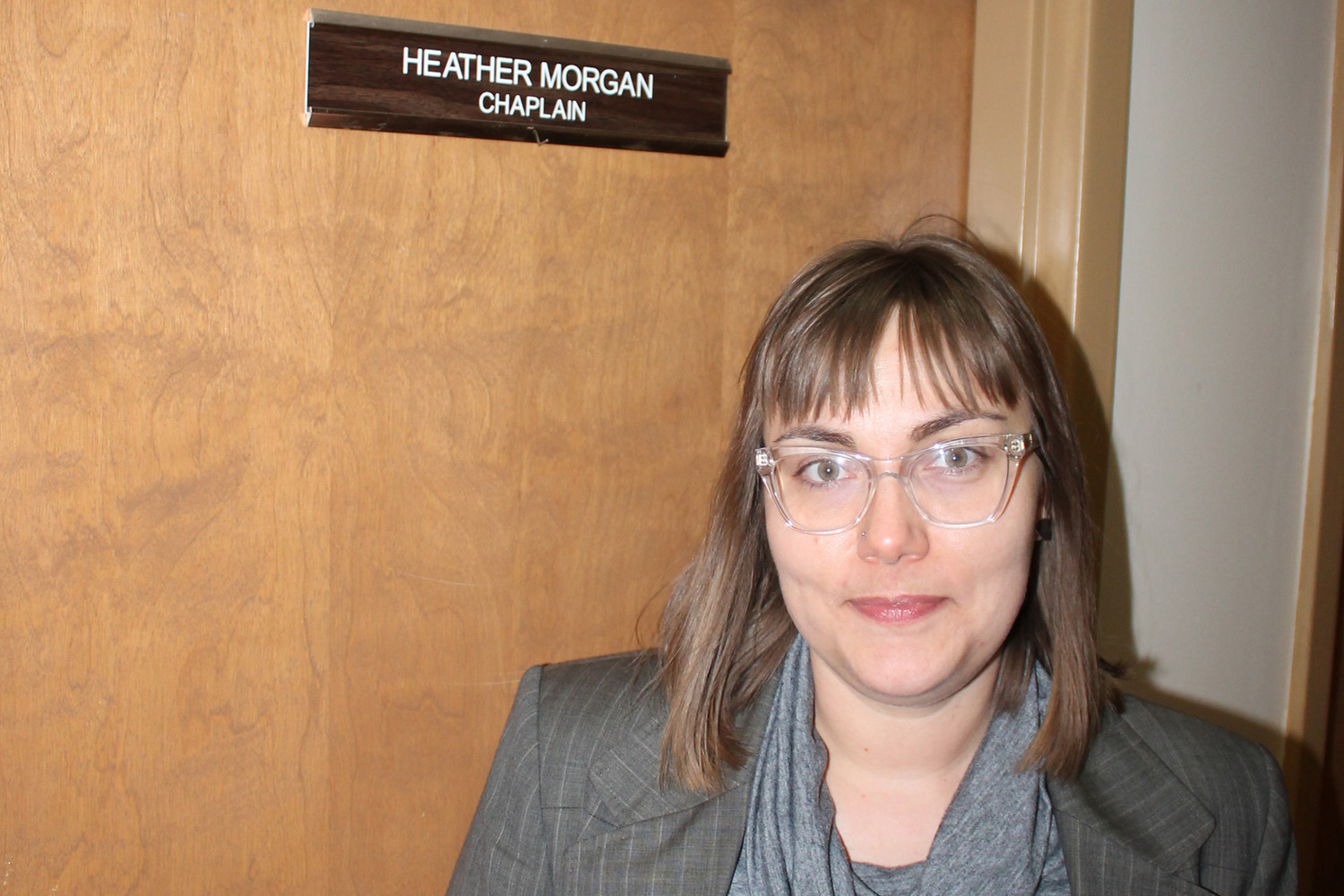Valley Hope chaplain left the comfort of the ‘Upper Room’
Heather Morgan now helps people who are fighting addictions discover God
Heather Morgan gets to watch little miracles unfold in her deep-lavender office at Valley Hope of Boonville.
These instances assure her that her desire to please God does, in fact, please Him in the place where she has been led to serve.
“God has His own way of doing stuff, and I don’t know how He does it,” she said. “But when He reaches people, He really reaches people! And they tell me about it. And I get to be here with them, to support them.”
A lifelong Catholic, former secretary for St. Thomas More Newman Center parish in Columbia, and current parishioner of Sacred Heart in that same city, Ms. Morgan has been a full-time chaplain at Valley Hope since last November.
She ministers one-on-one to people of all faith backgrounds and persuasions who are working to overcome addiction to drugs or alcohol.
“We try to walk with them, to be their spiritual companion,” she said of the Valley Hope chaplains. “People may come in and say, ‘I don’t know Who God is. Can you tell me Who God is?’ And we talk about things that they can do to find God, to get to that place that I call ‘the God hug’ — where you just feel totally at peace and loved, where you feel comforted in those times when you’re so, so down.”
Valley Hope is a part of a network of private, nonprofit addictions-treatment facilities founded by a doctor and his friend in Norton, Kansas.
Its inpatient centers are primarily in rural communities from which people would otherwise have to travel great distances to receive this kind of treatment.
Although nonsectarian, the inpatient centers are among the few that have chaplains on staff.
“The people who founded us really have an eye for the spiritual aspect of recovery,” said Ms. Morgan. “If you look at the 12 steps, it’s all about a higher power, it’s all about spirituality.”
Ms. Morgan noted that although most of the people she sees have at least some faith background, others have none at all and may have no inclination to encounter the divine.
“So I try to find a language through which they can find comfort and peace — to shine a ‘God light’ into their lives,” she said.
She believes awareness of God and His everyday interventions is an important part of any 12-step program for addiction recovery.
“Jesus is all over this place,” she said. “People tell their stories of how they got here, and there’s often no way it could have happened if it weren’t for divine providence.”
A difficult question
Ms. Morgan is pursuing a master’s degree in pastoral studies through the Loyola University of New Orleans’ online Loyola Institute for Ministry (LIM) program.
Previously, she earned a Clinical Pastoral Education credit at Boone Hospital Center in Columbia outside of her normal working hours under a program facilitated by the chaplain there.
“My dad gave me the best compliment the other day,” she said. “He told me, ‘You’re so driven! I can’t imagine that this isn’t going to work out for you.’”
It’s a long way from Newman, where Ms. Morgan thought she had all she’d ever want.
She had found her niche at St. Thomas More Newman Center parish, serving as a secretary in a collaborative, affirming, Spirit-infused, Christ-centered environment.
Then Dominican Father Patrick Tobin, a former associate pastor, came back for a visit. He asked her, “What’s your five-year plan?”
“This is it!” she replied. “I’ve made it! I want to be here forever, and I’m super-excited about it.”
But by asking, the priest set off a wave of restless second-guessing.
“And I’m glad that he did that because I was clearly called to more,” said Ms. Morgan. “But it’s super-scary to trust.”
She had already begun serving as an extraordinary minister of Holy Communion at the Newman Center, inspired by her Aunt Maryle’s example of visiting people at home and taking Holy Communion to them.
She talked to Dr. Eleanor Braddock, now deceased, who was one of the founders of the Columbia Catholic Hospital Ministry, and Deacon Gene Kazmierczak, a longtime member of the hospital ministry team.
“I started to do this ministry at Boone Hospital,” she said. “Eleanor trained me, Gene commissioned me, and it started from there.”
With a grant from the Catholic Extension Society of America, she attended an October 2015 graduate certificate program in parish health and wellness ministry at Loyola University of Chicago.
While getting some experience and working toward her master’s degree, she started looking for chaplain work in the area.
She found an opening at Valley Hope and applied.
Deacon David Miller of Ss. Peter & Paul parish in Boonville had held the chaplain post ahead of her and was retiring. He had joined the Valley Hope staff after retiring from the Missouri Department of Corrections, having vigorously promoted intensive therapeutic communities for addiction recovery during his 13 years as superintendent of the Boonville Correctional Center.
Deacon Kazmierczak gave Deacon Miller a good word about Ms. Morgan.
She got an interview, then she got the job.
One giant leap
Still unsure about giving up financial, spiritual and emotional security at Newman, she took a leap of faith.
“More like walking off a cliff,” she said. “It would be a lot easier to trust God if He’d just send me an e-mail with an itinerary.”
Instead, He caught her and lifted her up.
“I think my own difficulty trusting helps me identify with patients when they want to give up,” Ms. Morgan noted. “They know they can find at least temporary relief in going back to using, but they have to trust that they’re working toward something better — that they’ll find a more permanent peace in sobriety.”
Each Valley Hope patient meets regularly with a chaplain, who answers questions and offers support and guidance.
“I’m not here to preach to them, only to be present to them, accompany them on their walk and help draw out their own spirituality,” said Ms. Morgan.
“If someone on the street asked me, ‘What do you believe?’ I’d say, ‘I’m Catholic. I believe in God the Father, in Jesus, in the Holy Spirit. I go to Mass and I have an affinity for Ignatian spirituality.’”
On the job, her answer would be: “I’m Catholic. But I’m here to discuss what it is that YOU believe. And what is it that you believe? And what did you grow up with? And how do you feel about that? And are you comfortable with it? Have you ever felt that feeling of being at peace or comforted?”
For people who are atheist or agnostic, she sometimes draws on popular culture such as “Star Wars,” “Lord of the Rings” or “The Hobbit.”
“I think universal love, universal light is always there, and people just aren’t able to see it sometimes because they’re in their addiction, they’re in their depression, they’re in their disease,” she said. “So once we’re trying to get them out of the recovery room, when the fog lifts, then it’s easier for them to get in touch with the things that they have been numbing out for quite some time.”
Occasionally, she encounters someone who despised their Catholic upbringing.
“What’s really cool is when I get people who say, ‘I was raised Catholic and I hated it, and I don’t want to do that anymore, it was so horrible’ — and then turn around the next week and say, ‘I want to see what that’s about’ — and then a week later say, ‘I really want to go to Mass. I really think I need to do that,’” she said.
Cups and saucers
In addition to their one-on-one work, the chaplains take turns leading a 10-minute daily meditation in the Valley Hope chapel.
“It’s super-cool to be able to talk about a piece of Scripture with people and how it applies to them and the forgiveness and love that they have, and that divine spark, the Holy Spirit, that’s in them that they need to recognize and accept to be in full communion with God,” said Ms. Morgan.
If feels like God is speaking through her whenever she stands up to lead the meditation.
“Sometimes when I have an idea of what I want to talk about, that will take like 30 seconds, and then the rest of the nine and a half minutes just kind of fill up,” she said.
Some days, she leaves work on Cloud Nine, awestruck by what’s she’s witnessed God do through her and the rest of the staff.
“And some days, I cry,” she said. “It can be pretty hard.”
She relies on her husband, her parents and a group of spiritual, supportive friends to hold her up.
In turn, she joins Valley Hope patients’ families in holding their loved ones up through their ongoing recovery.
While living at Valley Hope, each patient decorates a china cup to symbolize their lifelong commitment to overcoming addiction.
Spouses and relatives visiting for family sessions get to decorate a matching saucer.
After staying clean and sober for a year after finishing the program, former patients come back to retrieve their cup and their saucer — which supports the cup.
“Is that a neat symbol or what?” Ms. Morgan said.
Comments
Other items that may interest you
Services
The Catholic
Missourian
2207 W. Main St.
Jefferson City MO 65109-0914
(573) 635-9127
editor@diojeffcity.org







